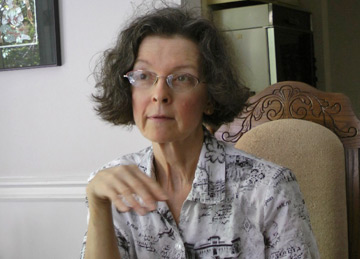Susan

Cares for her mother and cared for her father
Age at interview: 58
Age at start of caregiving: 45
Susan (58 years old) lives together with her husband, and has looked after her parents over several years. Susan’s parents lived in BC and needed increasing levels of care as they were dealing with different medical problems. After Susan’s father died, Susan’s mother decided to move to an independent living retirement community in the Maritimes, five minutes away from her daughter. Susan has worked as a provincial director of home care but took early retirement due to her own medical condition.
Susan’s caregiving activities started when she was 45 years old. Her parents, who were living 3000 miles away at the time, were dealing with multiple medical problems. Susan’s involvement started with increasingly frequent phone calls, however, she found that there were moments when she needed to go to them as they could not be resolved by phone. Susan found herself constantly deciding about whether or not and when to visit her parents or if she should sit and wait. She made frequent visits (35) in this 15 year period. Susan, who was working at that time, managed to combine the visits with her holidays, however, this meant that she did not really have holidays to recuperate but instead continued taking on more and more caregiving responsibilities.
Susan later took early retirement due to her own medical condition. In a strange way, she felt that this freed her up to spend more time on the care for her parents and with respect to the caregiving, it all worked out well. Eventually, six years ago, Susan’s father passed away and her mother decided to move to the Maritimes to an independent living retirement community to be closer to her daughter. Susan’s caregiver’s tasks are mainly to socialize with her mother, help with grocery shopping and support her mother in dealing with the medical system. Susan’s mother likes to be as independent as possible and Susan supports her in that decision by trying to fill in when her mother is unable to do things on her own. Susan says that sometimes there is a fine line between when to decide to get directly involved and when to remain on the encouraging side. To continue maintaining this fine balance is one of her bigger challenges.
In the time that Susan’s father was still alive and her parents were living in BC, Susan consciously chose not to be in contact with the healthcare professionals but to keep informed through communications with her parents. This decision was in line with the thought of supporting them in their independence although she found it sometimes difficult to get the medical information she needed this way. Susan says that if she would have to redo this period again she would probably be more proactive in contacting healthcare professionals directly.
Susan appreciates the support she receives from her friends. She is able to discuss issues about caregiving with her friends and they try to provide her with support and advice. Susan feels her friends are very tolerant with her, even when she has not been able to remain in contact with them as much as she would like. In fact, this is something Susan would like to give as advice to friends and family: sometimes caregivers are consumed with many responsibilities and, therefore, unable to have as frequent contact as usual with their friends. In those and other times, it is greatly appreciated when friends are able to keep an open mind and have a tolerant and supportive attitude towards the caregiver.
More content
- What is it like to be a caregiver? – SusanCaregiving is not always the best word. For Susan, it is a person’s responsibility to their family.
- Uncovering how and why caregivers care – SusanBy nature, Susan is a helper. She has received care herself and she knows how important it is to give.
- Navigating the system – SusanSusan mostly gets advice from her friends. She also helped develop a caregiving library in her province.
- Advice for professionals and society – SusanSusan stresses the importance of adequate policies among employers.
- Advice for other caregivers – Susan“Take a step back and find out what services you can engage.” Susan suggests taking a moment to find what is available and where to get help.